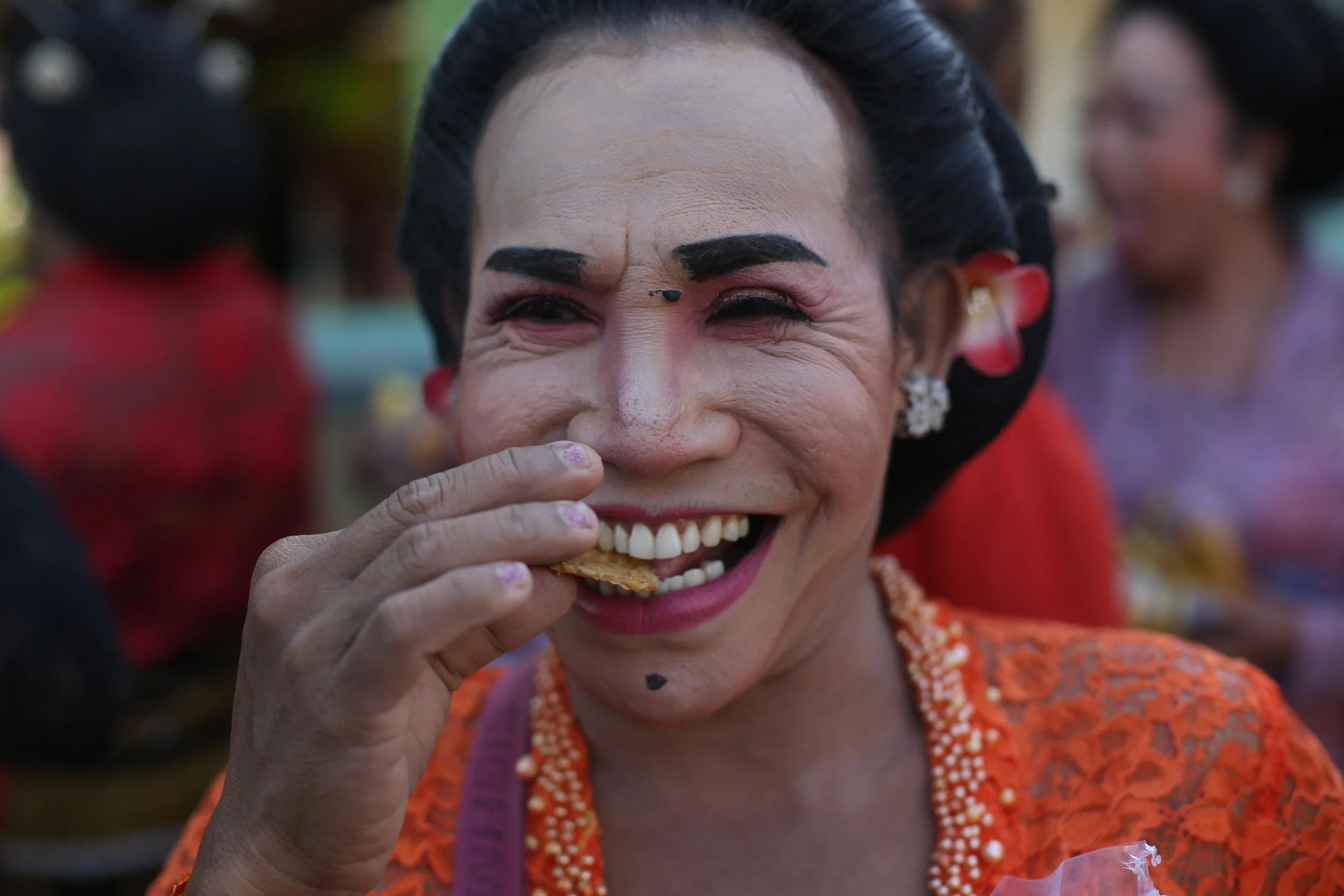Islamic Montage: A Day in an Indonesian Islamic School
This documentary project, supported by the AIFIS-Luce Documentary Filmmaker Grant, explores a day in the life of Pesantren al-Muttaqien Pancasila Sakti in Central Java, an Islamic boarding school founded by Mbah Liem, a close associate of former president Abdurrahman Wahid. Using archival footage from Leiden University’s “Remembering the Future” collection, the film highlights how students integrate Islamic ethics with civic values, national identity, and interfaith respect. Through ethnographic storytelling, it seeks to challenge Western misconceptions of Islam by offering a human, intimate portrayal of young Muslim students whose lives embody harmony between faith, democracy, and hope for the future.
Memorial
Between 1965 and 1966, a series of human rights violations were enacted against people who were accused of being members of Partai Komunis Indonesia/PKI (Indonesian Communist Party), resulting in the deaths of 500,000 - 1.2 million people. Memorial follows Bedjo Untung, 75 years old, as he tirelessly pursues justice for survivors and relatives of the victims of the 1965 genocide. A survivor of the atrocities, Bedjo Untung continues to document the mass graves scattered across Indonesia despite facing many obstacles from the state and other intolerant civil groups. The film explicates on the themes of resilience in the pursuit of justice and a nation’s inability to come to terms with a violent legacy.
Barang Panas (Hot Matter)
“Barang Panas” (Hot Matters) is a documentary film depicting social and environmental issues related to geothermal project in the larger context of energy transition in Indonesia. Located strategically located on the Ring of Fire, Indonesia has roughly 40% of the world’s known geothermal reserves (at 29 GW). It is currently second in the world for installed capacity, after the US, but this accounts for only about 7% of its geothermal potential. Aim to utilize this potential in the context of its global commitment for green energy transition, Indonesia is in the process of exploiting its geothermal deposits. Produced by Ekspedisi Indonesia Baru and Sunspirit for Justice and Peace, with the support from JATAM (Mining Advocacy Network) the film documents the dynamics of Indonesia’s geothermal sites from Sumatra, Java, Bali and Flores and interrogates the claim of “environmentally friendly” to geothermal energy.
Anton Solihin and Batu Api Library: A Passion for Literacy
My project focuses on filming Anton Solihin, the owner and caretaker of Batu Api Library. Batu Api is a private library in Jatinangor, an education area around 26 miles from Bandung, the capital of West Java province, Indonesia. Since it was founded on April 1, 1999, Batu Api has collected thousands of books and documents about Indonesia, as well as films, musical recordings, and newspaper clippings. Anton and Batu Api would provide interesting stories about the side of Indonesia that many people, in the U.S. and even in Indonesia, might not be aware of. The story might not have a direct relationship with daily life in the U.S., but it most likely has been shaped, influenced, and affected by U.S.-sponsored globalization.
Menolak Lupa: Youths in Indonesia-Timor-Leste Connections
The film follows the main character, an Indonesian student, on her journey to study Indonesia’s history with Timor-Leste for her undergraduate thesis. At the start of the film, she introduces herself, shares about her motivation in studying about Indonesia-Timor-Leste relations and describes her prior knowledge about it. The film follows her trip to Timor-Leste, where she meets a Timorese student who becomes her learning acquaintance. The main character gets to meet one survivor of the Santa Cruz Massacre and visits several historical sites in Dili and Baucau. Her journey in Timor-Leste is juxtaposed with photos and videos that documented the incidents, as well as commentaries from an academic and a survivor. She reflects on her experience in Timor-Leste, how her knowledge and position has grown since she arrives, and her future hopes on youth connections between the two countries.
Guna Pering: Bamboo Voices of Bali
This documentary explores the life and cultural significance of bamboo in Bali through the sounds of the suling (flute) and sunari (wind-played bamboo pole), instruments that symbolize the human and cosmic worlds in Balinese philosophy. Following bamboo from its groves in Kintamani to workshops, ceremonies, archives, and performances across Bali, the film features master instrument makers, priests, artists, and scholars to reveal how bamboo shapes music, ritual, literature, and daily life. Visually and sonically rich, it highlights bamboo as both material and spiritual companion to the Balinese, addressing the central question: what is the importance of bamboo to the Balinese people?
The Sound Guardians
Jakarta is the world’s fastest-sinking city, with 40 percent of its land already below sea level. President Joko Widodo has led the charge to build Nusantara, a new capital to replace Jakarta. It's a carefully designed, sustainable, “smart” forest-city on a site twice the size of New York City in the hills of east Borneo. But scientists and indigenous groups have raised serious concerns about building a city from scratch in the middle of a forest. The Balik is an indigenous group that has lived within Nusantara’s footprint for generations. Now, the government has warned entire neighborhoods that they will eventually need to leave their homes. As the relocation of Jakartans ushers in the dislocation of the Balik in the name of climate adaptation, the film will explore universal questions such as, how do we preserve our identities while adapting to climate change?
Tonggo Gedek (Woven Bamboo Neighbour)
This film follows the journey of transgender performers at Ludruk Tobong Irama Muda in Ponorogo, one of the last remaining traditional East Javanese ludruk troupes. Led by Sunarti, a veteran make-up artist and community leader, and joined by Lala, a 16-year-old newcomer, the troupe provides both a stage and a shelter for transgenders from across cities to express their identities while preserving ludruk art. Performing nightly on bamboo stages in rice fields despite social stigma, economic hardship, and dwindling audiences, they embody resilience and commitment to freedom of expression, solidarity, and the survival of a cultural tradition.
Water Cities, East Kalimantan
This hybrid social practice film engages young Indonesians in Jakarta and East Kalimantan to co-create a story about their hopes, anxieties, and cultural resilience as the nation’s capital moves to Borneo. Following two young Javanese women—a teacher and a student—the film weaves personal diaries, community dialogues, and collaborative performances choreographed by Eko Supriyanto, blending traditional and contemporary cultural expressions across Dayak, Javanese, Buginese, and Kutai traditions. Structured from dawn to dusk, it explores climate concerns, identity, and connection as youth navigate change, culminating in new dances and dialogues as gestures of hope and adaptation.
Leprosy and the Bare Life: A Visual Adaptation of J.B. Sitanala’s Tradition und Gefuehlsleben (1936)
This film adapts Joseph Batista Sitanala’s 1936 essay Tradition und Gefuehlsleben, which explored local folktales and beliefs about leprosy across Indonesia and compared them with colonial medical perspectives. By highlighting how Sitanala bridged indigenous knowledge and Western science, the film revisits a neglected chapter in the history of medicine that challenged colonial assumptions of European superiority. Through visual storytelling, it brings new attention to his insights on leprosy, illuminating their relevance today for science, medicine, anthropology, public health, and Indonesian studies.












